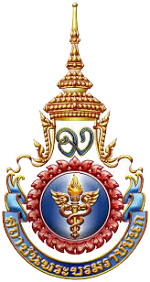ผลของโปรแกรมส่งเสริมความรอบรู้ด้านสุขภาพต่อพฤติกรรมสุขภาพของผู้ป่วยโรคเบาหวานชนิดที่ 2 ที่ควบคุมระดับน้ำตาลในเลือดไม่ได้ ในอำเภอพระพรหม จังหวัดนครศรีธรรมราช
คำสำคัญ:
โปรแกรมส่งเสริม, ความรอบรู้ด้านสุขภาพ, พฤติกรรมสุขภาพ, โรคเบาหวานชนิดที่ 2บทคัดย่อ
การวิจัยครั้งนี้แบบกึ่งทดลอง ชนิด 2 กลุ่ม วัดหลังการทดลอง มีวัตถุประสงค์เพื่อเปรียบเทียบพฤติกรรมสุขภาพ และค่าน้ำตาลในเลือดสะสมระหว่างกลุ่มทดลองและกลุ่มควบคุม หลังให้โปรแกรมความรอบรู้ด้านสุขภาพของผู้ป่วยโรคเบาหวานชนิดที่ 2 ที่ควบคุมระดับน้ำตาลในเลือดไม่ได้ในอำเภอพระพรหม จังหวัดนครศรีธรรมราช คำนวณกลุ่มตัวอย่าง 102 คน แบ่งเป็นกลุ่มทดลอง 51 คน และกลุ่มควบคุม 51 คน การสุ่มตัวอย่างใช้วิธีสุ่มอย่างง่าย โดยการหยิบฉลากเข้ากลุ่มทดลองและกลุ่มควบคุมสลับกัน เครื่องมือที่ใช้เป็นเครื่องมือวัดความรู้แจ้งแตกฉานด้านสุขภาพ และโปรแกรมการพัฒนาความรอบรู้ด้านสุขภาพต่อพฤติกรรมการป้องกันโรคเบาหวานชนิดที่ 2 ได้ค่า IOC ระหว่าง 0.5 – 1.00 และพฤติกรรมการดูแลตนเองของผู้ป่วยโรคเบาหวาน ได้ค่าสัมประสิทธิ์ เท่ากับ 0.71 สถิติที่ใช้ คือ สถิติเชิงพรรณนา, Chi-square, Mann-Whitney u test และIndependent t-test
ผลการวิจัย พบว่า กลุ่มทดลองมีค่าเฉลี่ยพฤติกรรมการดูแลตนเองสูงกว่ากลุ่มควบคุมอย่างมีนัยสำคัญทางสถิติที่ 0.05 (p-value = 0.002) สำหรับค่าน้ำตาลสะสมในเลือดไม่แตกต่างกับกลุ่มควบคุม (p-value = 0.368)
ฉะนั้น ควรนำโปรแกรมไปประยุกต์ใช้กับผู้ป่วยในคลินิกเบาหวานของโรงพยาบาลและโรงพยาบาลส่งเสริมสุขภาพตำบลในเครือข่าย แต่ควรจะต้องปรับโปรแกรมโดยพิจารณาการตรวจค่าน้ำตาลในเลือดสะสมตามหลักวิชาการ
เอกสารอ้างอิง
American Diabetes Association. (2007). Standard of medical care in diabetes 2007, Diabetes Care, 30(suppl 1), S4–41.
Arahung, R. (2017). The effects of health literacy enhancement program on hypertensive prevention behavior of pre-hypertension risk group at a community in Nakhon Pathom province. A dissertation submitted in partial fulfillment of the requirement for the Master of Nursing Science (Community Nurse Practitioner), Christian University. (in Thai)
Cohen, J. (1988). Statistical power analysis for the behavioral sciences (2nd ed.). Hillsdale, NJ: Lawrence Erlbaum Associates.
Division of Health Education, Department of Health Service Support, Ministry of Public Health & Mahidol University. (2015). Development of health literacy measurement tools for patients with diabetes and hypertension. Bangkok: Mahidol University. (in Thai)
Division of Non-Communicable Diseases, Department of Disease Control. (2018). World diabetes day campaign issues 2018. Retrieved October 20, 2023, from http://www.thaincd.com/document/docs_upload/WorldDiabetesday61.pdf (in Thai)
Division of Non-Communicable Diseases, Department of Disease Control. (2021). The Department of Disease Control campaigns for World Diabetes Day 2021 to raise awareness of diabetes care and to ensure equitable access to treatment. Retrieved October 20, 2023 from https://www.ddc.moph.go.th/brc/news.php?news=21692&deptcode=brc (in Thai)
Faul, F., Erdfelder, E., Lang, A. G., & Buchner, A. (2007). G*Power 3: A flexible statistical power analysis program for the social, behavioral, and biomedical sciences. Behavior Research Methods, 39(2), 175–191.
Jiamjarasrangsi, W. (2018). Type 2 diabetes: prevention and support for self-management. Bangkok: Chulalongkorn University Press. (in Thai)
Kaeodumkoeng, K., & Tripetchsriurai, N. (2011). Health literacy (2nd ed.). Nonthaburi: Ministry of Public Health. (in Thai)
Lalun, A. & Wirunphan, B. (2021). Effects of Self-Management Programs on Hemoglobin A1C Levels and Quality of Life in People with Diabetes Mellitus in the District of Kanghhro Hospital, Chaiyaphum Province. Journal of Boromarajonani College of Nursing, Surin, 11(1), 66–80. (in Thai)
Munsrakeat, K., Rawiworrakul, T., & Lagampan, S. (2019). Effects of Self-Management Program for Glycemic Control Among Insulin Depen-dent Type 2 Diabetes Patients. The Journal of Baromarajonani College of Nusing, Nakhonratchasima, 25(2), 87–103. (in Thai)
Nakhon Si Thammarat Provincial Public Health Office. (2023). Non-communicable disease report. Nakhon Si Thammarat: Nakhon Si Thammarat Provincial Public Health Office. (in Thai)
Nutbeam, D. (2000). Health literacy as a public health goal: A challenge for contemporary health education and communication strategies into the 21st century. Health Promotion International, 15(3), 259–267.
Pannark, P., Moolsart, S., & Kaewprom, C. (2017). The effectiveness of a program for health literacy development of the patients with uncontrolled type 2 diabetes at Bangwua District, Chachoengsao Province. Nursing Journal of The Ministry of Public Health, 27(3), 91–106. (in Thai)
Pattanakasetwong, N., Puakaosal, B., & Prempreeda, J. (2024). Factors influencing diabetes patients with unpredictable blood sugar levels’ self-care practices in Nabon District, Nakhon Si Thammarat Province. Southern Regional Primary Health Care Journal, 38(Supplement), 119–130. (in Thai)
Sanguanthammarong, S. (2018). Nursing manual 2018: Enhancing self-monitoring of blood glucose skills for patients with type 2 diabetes mellitus receiving insulin and experiencing hyperglycemia. Retrieved July 20, 2024 from https://www2.si.mahidol.ac.th/division/nursing/sins/attachments/article/472/SMBG%20630225%20Revi.pdf. (in Thai)
Sittisart, V., Suwannakit, S., & Nawamawat, J. (2023). The effectiveness of health literacy development program on self-management ability among diabetes mellitus type 2 patients with uncontrolled blood sugar, Ban Khlong sub-district, Mueang, Phitsanulok. Journal of Health Science and Community Public Health, 6(2), 127–138. (in Thai)
Sukprasan, T., Rattanawarang, W., & Jaruchawalit, P. (2018). The relationship between functional health literacy and blood sugar level control in patients with type 2 Diabetes in Buddhachinaraj hospital, Phitsanulok. Journal of Health Education, 41(2), 157–167. (in Thai)
Thongsongkris, W. (2022). The development of the health literacy on blood sugar control for diabetes type II patients, Kaolieo, Nakhonsawan. Region 3 Medical and Public Health Journal, 19(1), 1–14. (in Thai)
Tongkum, R. (2022). Effects of health literacy promotion on the self-care behaviors of patients with type II diabetes mellitus in Lopburi province. Singburi Hospital Journal, 30(3), 86–99. (in Thai)

ดาวน์โหลด
เผยแพร่แล้ว
รูปแบบการอ้างอิง
ฉบับ
ประเภทบทความ
สัญญาอนุญาต
ลิขสิทธิ์ (c) 2024 วิทยาลัยพยาบาลบรมราชชนนี นครศรีธรรมราช

อนุญาตภายใต้เงื่อนไข Creative Commons Attribution-NonCommercial-NoDerivatives 4.0 International License.
บทความที่ได้รับการตีพิมพ์เป็นลิขสิทธิ์ของ วิทยาลัยพยาบาลบรมราชชนนี นครศรีธรรมราช
ข้อความที่ปรากฏในบทความแต่ละเรื่องในวารสารวิชาการเล่มนี้เป็นความคิดเห็นส่วนตัวของผู้เขียนแต่ละท่านไม่เกี่ยวข้องกับวิทยาลัยพยาบาลบรมราชชนนี นครศรีธรรมราช และบุคคลากรท่านอื่น ๆ ในวิทยาลัยฯ แต่อย่างใด ความรับผิดชอบองค์ประกอบทั้งหมดของบทความแต่ละเรื่องเป็นของผู้เขียนแต่ละท่าน หากมีความผิดพลาดใดๆ ผู้เขียนแต่ละท่านจะรับผิดชอบบทความของตนเองแต่ผู้เดียว





